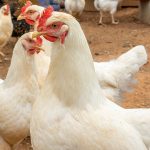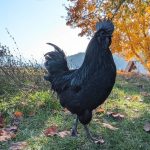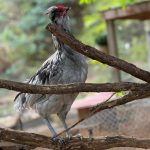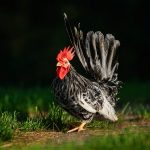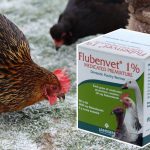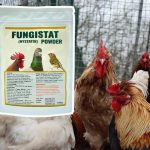Splash Laced Red Wyandotte: Breed Profile
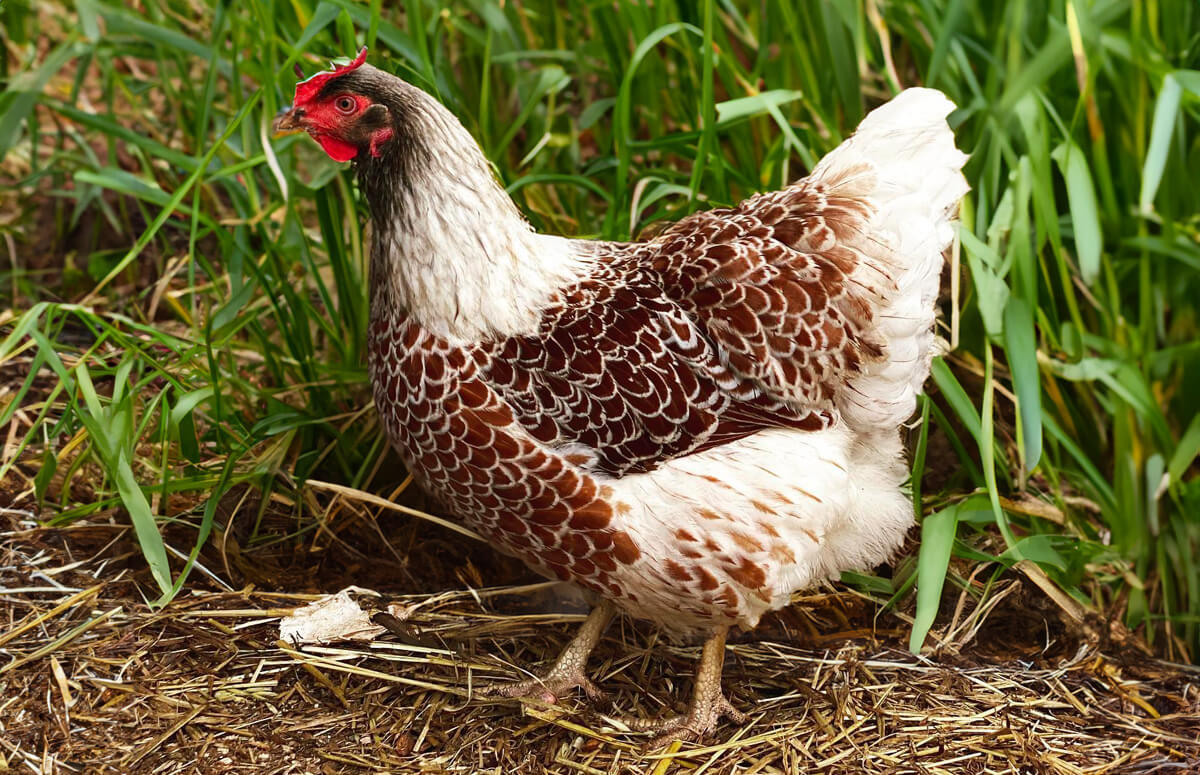
Characteristics | Eggs | Climate | Rooster vs Hen | Splash Laced Red Color Pattern | History | Genetics | Breeding | Blue vs Splash | Personality
The Splash Laced Red Wyandotte is a captivating chicken that has caused much intrigue and confusion in the breeding world. They are amazing backyard chickens to keep, and understanding the difference between blue and splash lacing can help appreciate the unique beauty of these birds.
| Eggs | 200 eggs/year |
| Egg Color | Brown |
| Egg Size | Large |
| Weight | 6.5 – 8 lbs |
| Hardiness | Cold Hardy |
| Temperament | Friendly but assertive |
| Beginner-friendly | Yes |
| Color | Reddish brown with pale grey splash lacing |
Characteristics
Splash Laced Red is not an officially recognized color variety of Wyandotte chickens in the US, but it is gaining more popularity every day because of its unique appearance. The birds have a pale gray splash lacing on their base reddish brown plumage.
Like the other chickens in the Wyandotte chicken family, the Blue Laced Reds are rather large and rounded. Blue Laced roosters tip the scale at 8 pounds (3,6kg), and Blue Laced hens weigh around 6.5 pounds (2,9kg).
The scalloped pattern is usually seen on the back and the wings. The back of the tail, the hackles, and the legs are predominantly white.
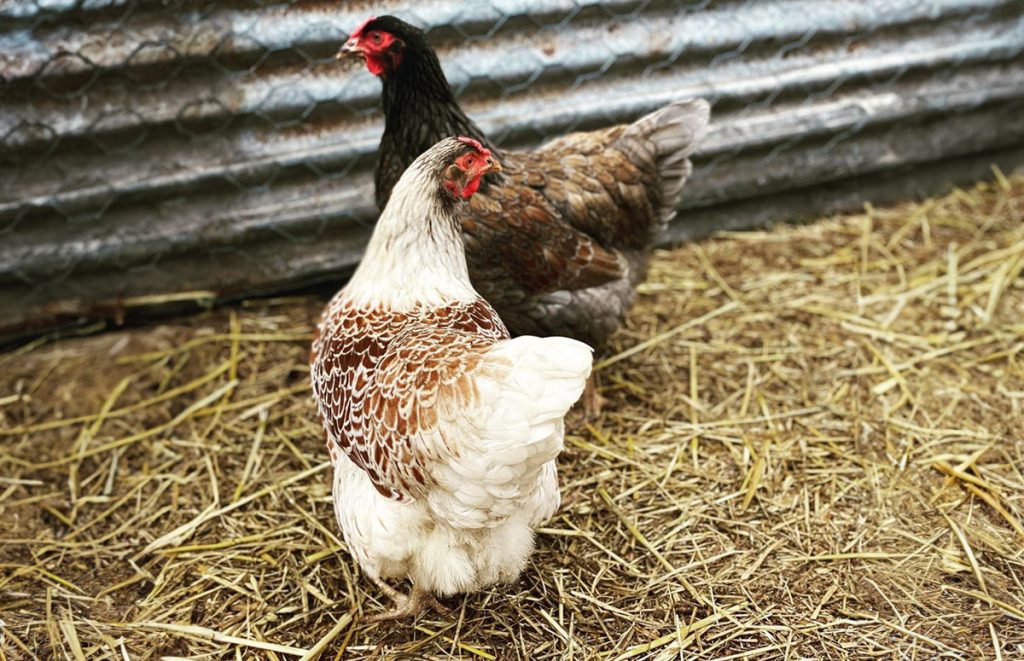
Splash Laced Red Wyandottes have a red rose comb, clean yellow-skinned legs, and red wattles and earlobes. Their beaks are dark golden, and their eyes are yellow.
In line with the Wyandotte breed’s characteristics, they possess well-developed, plump breasts, making them a superb choice for both meat production and laying capabilities.
Eggs
Splash Laced Red Wyandottes are reliable layers, producing approximately 200 medium to large brown eggs each year. While they may slow down or pause during winter, adding extra light can encourage year-round laying.
These dual-purpose birds are valued for their meat and egg production. They typically cease laying only during the annual molt in late summer or early fall. Wyandottes may occasionally go broody, which is advantageous for hatching eggs but temporarily halts egg production. Broody hens do not lay eggs.
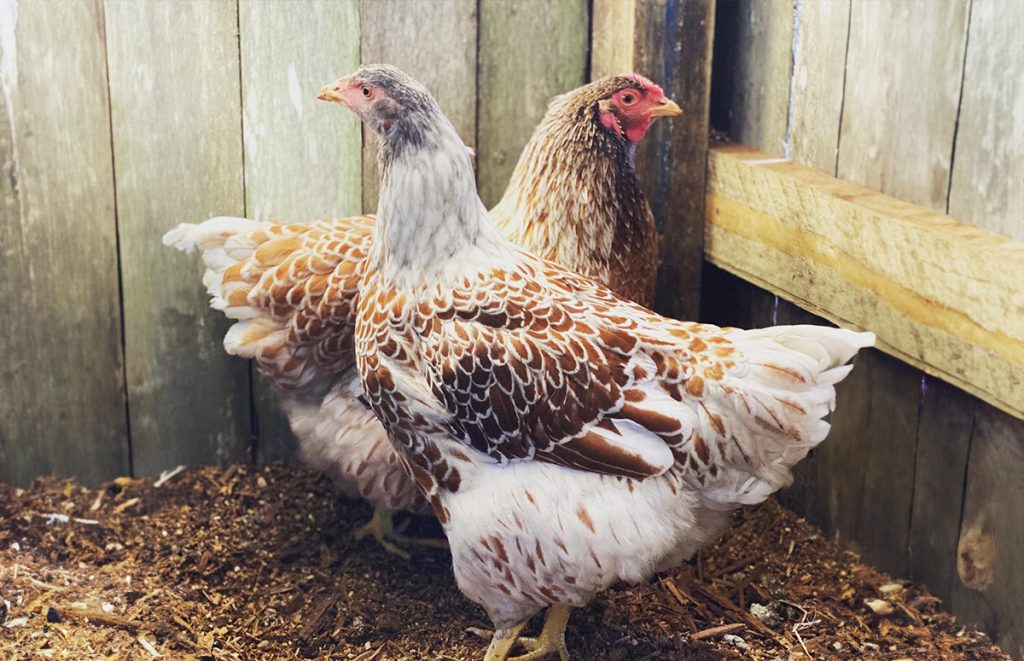
Climate
Like all Wyandotte chickens, Splash Laced Red Wyandotte chickens are a hardy breed, making them suitable for cold climates. Wyandottes have especially been bred since 1870 to stand cold American winters.
Their rose combs are much less susceptible to frostbite than single combs, and their dense feathering helps to keep them warm during colder winters. However, it’s not because they have a white jacket that they are polar bears, either.
On the flip side, Splash Laced Red Wyandottes aren’t too keen on tropical temperatures. So keep them cool during heat waves, or they’ll quickly overheat and suffer heat stress.
Splash Laced Red Wyandotte Rooster vs Hen
Both Splash Laced hens and roosters have the splash laced plumage. They share several features, such as the white fluff and white tails and the scalloped pattern on the wings. Young birds can be challenging to distinguish.
Roosters grow faster and have slightly more prominent and redder wattles and combs. As you can see in the picture below, those of the hens tend to be more pink. The roosters are also sturdier and have longer legs.
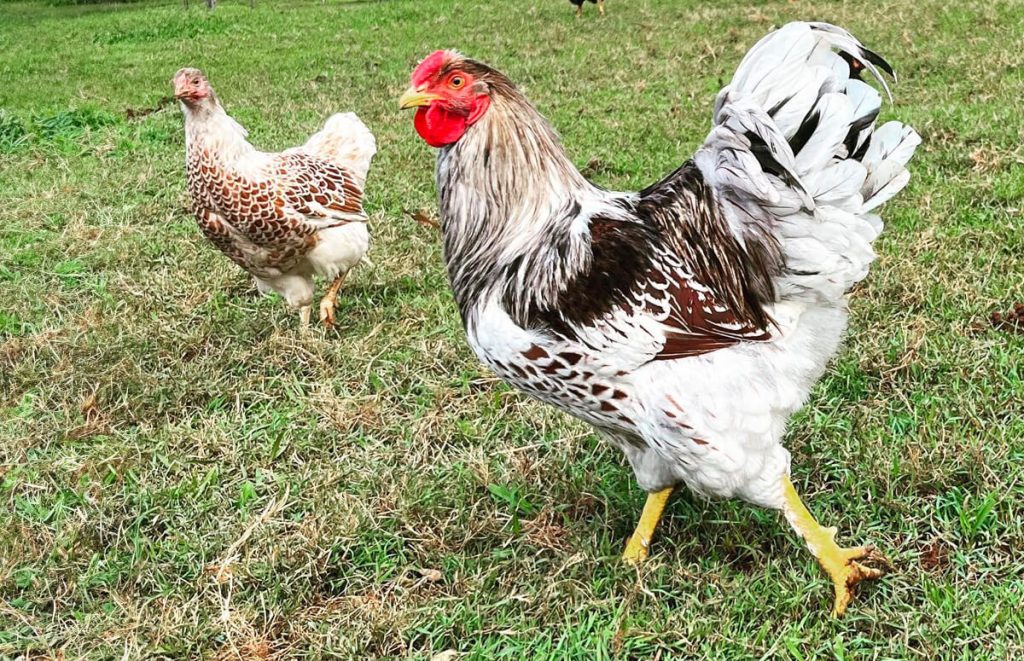
| Feature | Splash Laced Rooster | Splash Laced Hen |
|---|---|---|
| Weight | 8 lbs | 6.5 lbs |
| Back | Pointed saddle feathers | Rounded feathers |
| Plumage | Patchy (cockerels) | Uniform lacing (pullets) with white patches |
| Tail Feathers | Long sickles, pointed, no lacing | Laced, shorter, rounded on the edges |
| Tail Coverts | White with hints of black | White with hints of black |
| Comb, Wattles | Big, red | Small, pink |
| Body | Large and broad with long legs | Smaller, shorter legs |
Especially with the splash color, it can take a while to figure out if you’re dealing with hens or roosters. You can distinguish the gender in Splash Laced Wyandottes definitively by the age of 5 months.
The Splash Laced Red Color Variety
The Splash Laced Red variety is one of the many color varieties of Wyandottes. It’s not yet an officially recognized color by the American Poultry Association, which is something to bear in mind if you’re planning on entering poultry competitions.
The world of Wyandotte chicken colors can be complex, to say the least. While The Standard of the American Poultry Association (APA) recognizes only ten official varieties, the Europeans list thirty colors. Some include the Splash Laced Red variety or at least something very similar. For example, the Dutch standards describe an official Splash Laced Brown/Yellow color variety.
Let’s discuss the Splash Laced Red color and how it stacks up against the other variations.
Wyandotte chickens generally come in three classes:
- Laced Wyandottes: silver laced, gold laced, blue laced, …
- Marked Wyandottes: black-white Columbia, Silver Pencilled, …
- Single-colored Wyandottes: white, blue, black, buff, …
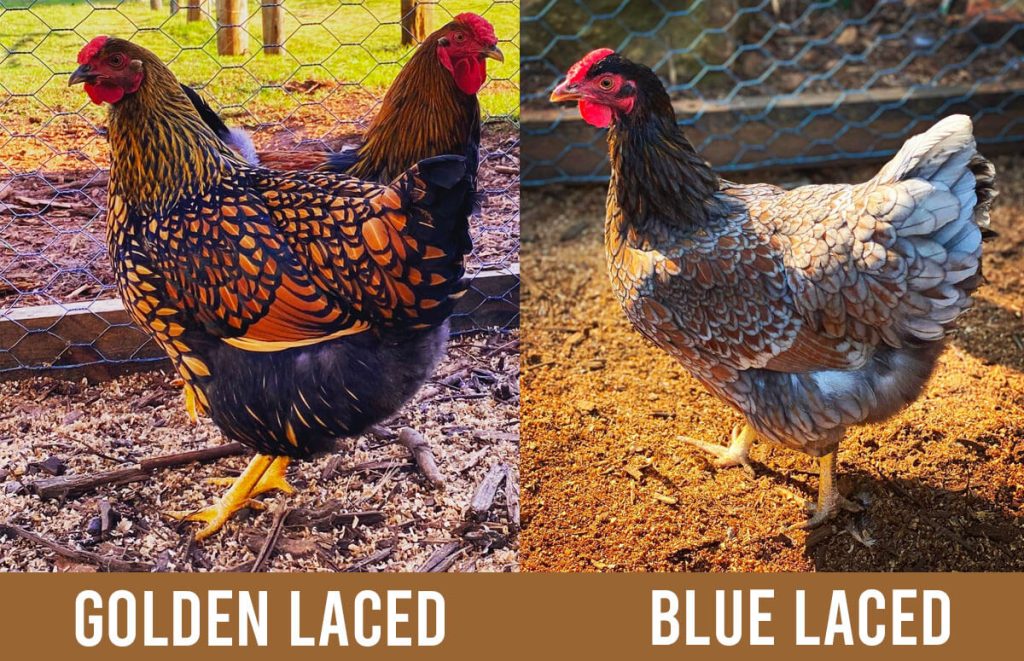
The Silver Laced Wyandotte is the original color variety. It’s a pure white bird with a black edge to its feathers. A Gold Laced Wyandotte is a gold bird with black lacing. The hens are mahogany brown.
If the Silver Laced is white and the Golden Laced is brown, you might assume the Blue Laced is blue (grey). However, the Blue Laced Red Wyandotte does not have a greyish body. Only their lacing is blue, and Blue Laced Red Wyandottes have a Red base color.
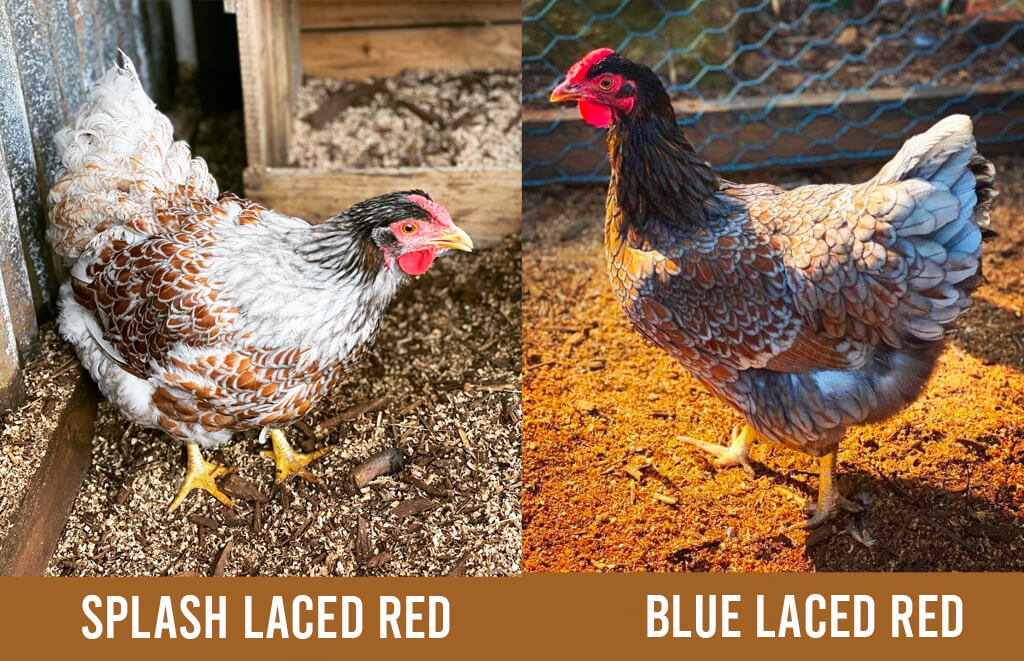
Finally, we arrive at the Splash Laced Red Wyandottes. If you look at the picture above, you can see that they are very similar to the Blue-Laced Red Wyandottes. They also have a brown to red ground color, but they carry two copies of the Blue gene, which renders their lacing and parts of their plumage almost entirely white.
Splash Laced Red Wyandotte Breeding
Splash Laced Red Wyandottes are Wyandotte chickens with two copies of the blue gene. They are a common by-product of breeders trying to breed the Red Laced Wyandottes that only carry a single blue gene.
Lacing
Breeding laced Wyandottes is quite the challenge compared to other color varieties. Getting a uniform and proper lacing around the inner field of the feather can take a couple of breeding cycles. Common errors are overly broad lacing, golden edges around the white feather border, the shaft stripe pattern breaking through in the hackles or saddle feathers, and irregular edging.
Ground Color
The biggest challenge in breeding Splash Laced Reds is to balance the red ground color. If it is too light, an unwanted grain can appear; if it is too dark, the overall appearance will be killed. Some birds have color contamination, like roosters with yellow in the sickle feathers or hens with entirely white feathers on the flanks and thighs. Some birds also have black in the flight feathers and tail feathers.
In general, the splash birds can look patchy and have white spots all over their bodies. Ideally, there’s a uniform pattern, with only some white at the end of the tail and in the hackles.
Crossing
Splash Laced Reds breed true. If you cross two splash-laced birds, the offspring will be splash-colored, too. But they do not if they are crossed with Blue Laced Reds or other varieties that carry the blue gene (like a Blue Laced Silver Wyandotte). Here’s the breeding table:
| Parent 1 | Parent 2 | Offspring |
|---|---|---|
| Blue | Blue | 50% Blue, 25% Black, 25% Splash |
| Blue | Splash | 50% Blue, 50% Splash |
| Black | Splash | 100% Blue |
| Splash | Splash | 100% Splash |
If you don’t have Splash lacing in your flock, you can create Splash Laced Wyandottes by crossing Blue Laced Reds. Crossing two Blue Laced Red Wyandottes gives you 25% Black Laced Wyandottes, 50% Blue Laced Wyandottes, and 25% Splash Laced Wyandottes.
If you want to breed chicks for sale and guarantee they are all splash, mate splash-laced with splash-laced. Every chick from this cross will be splash-laced.
Blue Lacing vs Splash Lacing
The key difference between blue and splash lacing in Wyandottes lies in the color of the lacing. Blue lacing is a more vibrant gray or violet, while splash lacing is pale gray. Blue is more sought after, while splash offers a more subtle appearance.
The greyish color of the lacing comes from the Blue gene, which dilutes the black pigments in the feather. Chickens with a single copy of the Blue gene (Bl bl+) look greyish and have Blue lacing. Birds with two copies (Bl Bl) have Splash lacing and look almost white.
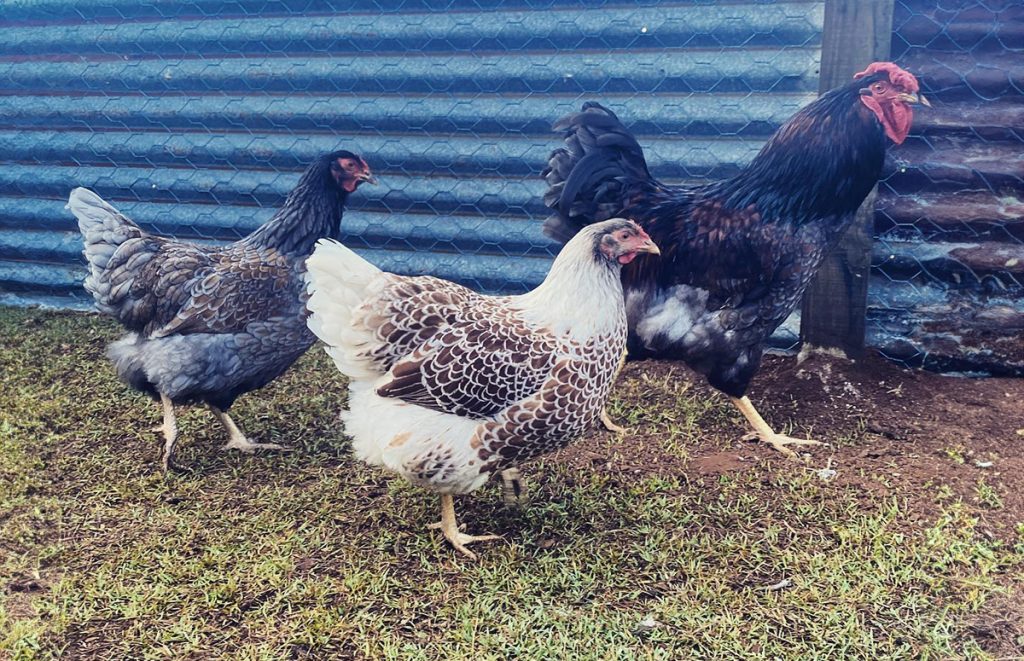
Splash Laced Red Wyandotte Genetics
The Splash Laced Red pattern in Wyandottes is the result of two effects:
- the yellow-brown to mahogany-red ground color
- the pale greyish lacing
Red Color
The ideal ground color varies. The British Standards for Red Wyandottes demand red-brown, while the Dutch standards mention yellow-gold-brown. Yellow to brown plumage is the natural wild type for chickens. This color comes from pheomelanin pigments in the feathers (the same pigment that makes our human lips red).
Red boosters can enhance this brown ground color in the feathers. A well-known example is the mahogany red of the Rhode Island Red, a popular egg-laying breed.
The most important red enhancer for Wyandottes is the Mahogany gene (Mh). It’s a dominant gene, so birds with a single copy (Mh/mh+) will show dark red. There is no consensus among breeders that a double dose of mahogany can show a darker tone.
Splash Lacing Genetics
The lacing pattern results from the interplay of multiple genes that shift the black pigment in the feather. The pattern gene (Pg) creates several stripes, the Melanotic gene (Mg) shifts them to the edge, and the Columbian gene (Co) removes the inner laces.
The greyish color of the lacing and the white in the tail and hackles come from the Blue gene. This gene dilutes the black pigments in the feather. Chickens with a single copy of the Blue gene (Bl bl+) look greyish. Birds with two copies (Bl Bl) look Splash or in some cases almost white.
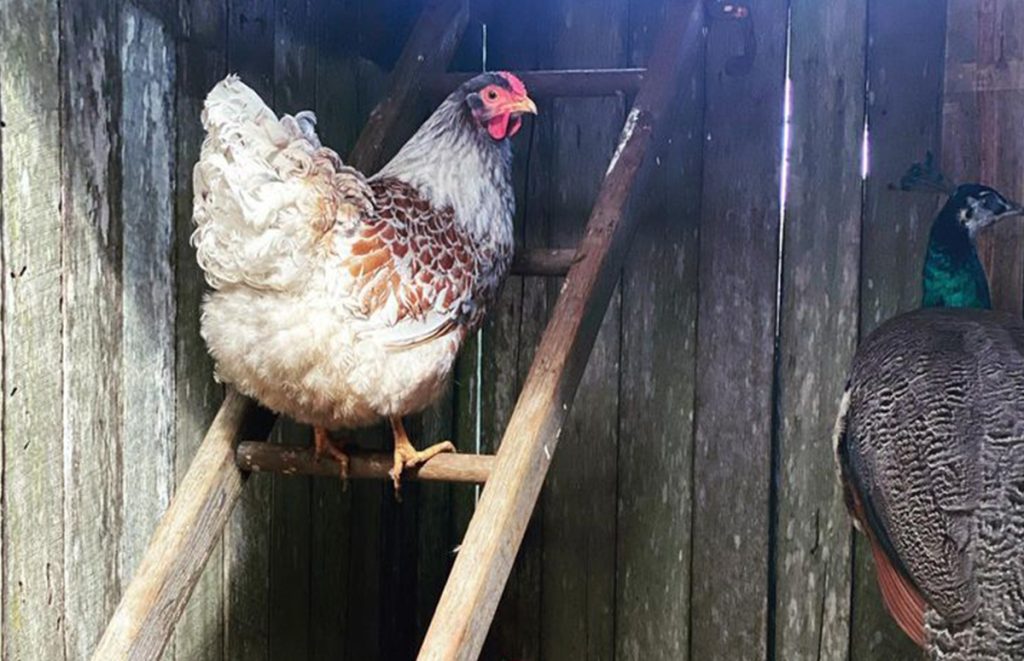
Splash Laced Red Wyandotte have two copies of the Blue gene, while Blue Laced Red Wyandottes only have one. The Golden Laced Wyandotte has no blue gene (bl+ bl+), resulting in black lacing.
History of the Splash Laced Red Wyandotte
The Wyandotte chicken was created in the United States during the 1870s by four breeders: H. M. Doubleday, John Ray, L. Whittaker, and Fred Houdlette. The Silver Laced Wyandotte was the first official color variation, gaining recognition in the American Standard of Perfection in 1883.
The origin of the Wyandotte remains a mystery, but according to Livestock Conservancy, it is believed to result from breeding efforts involving spangled Hamburgs and dark Brahmas.
After that, many varieties, including the Golden Laced and Blue Laced, were created.
The Buff Laced and Blue Laced varieties were first observed around 1897, emerging from the crossings of Gold Laced and White Wyandottes. The blue is comparable to the blue in the Blue Andalusian. The red is one of the latest varieties and was created in Lancashire from the Gold Laced, selectively bred with Wyandotte, Barnevelder, and Rhode Island Red.
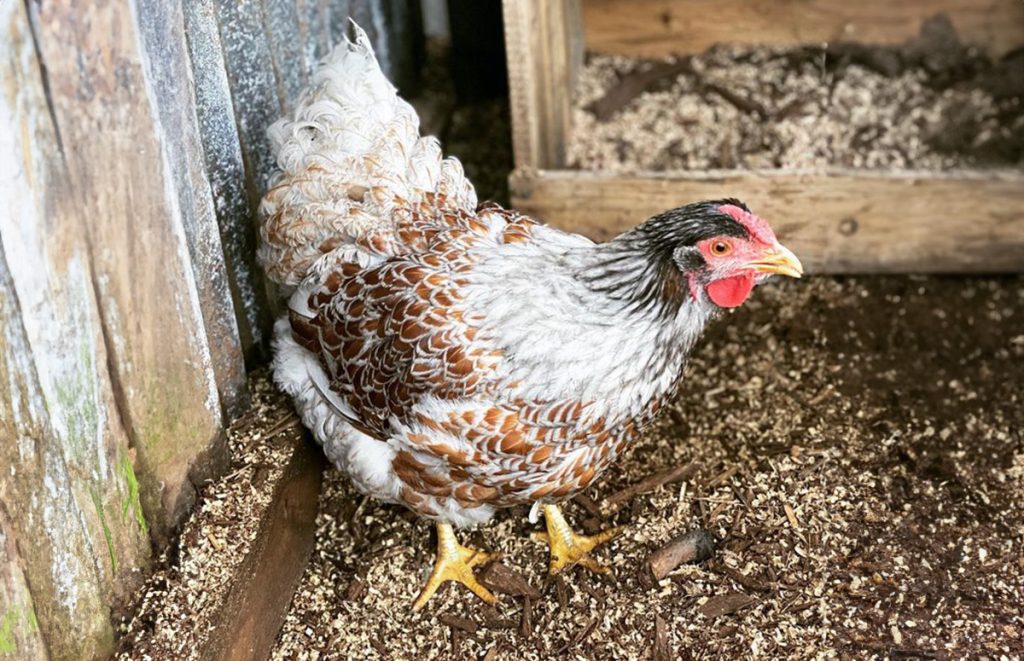
The Splash Laced Red was created simultaneously with the Blue Laced Red, being an inevitable byproduct of breeding with Blue Laced Red Wyandottes. However, the Splash Laced variety is not (yet) officially recognized in the US.
Personality
Splash Laced Red Wyandottes are typically gentle and friendly like all Wyandotte chickens. They show kindness towards humans and children, but they are a little bit too big to be considered lap chickens.
They are sociable and often enjoy human interaction, making them a popular choice for those who want a more personable backyard bird.
They generally get along well with other flock members, but it’s worth noting that the roosters can occasionally display dominant behavior. Due to their assertive nature and slightly heavier build, Wyandottes are usually high in the pecking order.
Related Articles
Here are some of the articles we mentioned:
- Wyandotte Chickens: an overview of the Wyandotte chicken breed and the color varieties
- Silver Laced Wyandotte: a breed profile of the Silver Wyandotte variety
- Silver Penciled Wyandotte: a breed profile of the Silver Penciled Wyandotte variety
- Golden Laced Wyandotte: a breed profile of the Golden Laced Wyandotte variety
- Columbian Wyandotte: a striking black and white variety of the Wyandotte chicken
- Blue Laced Red Wyandotte: a complete guide on the Blue Laced Red
- White Wyandotte: a breed profile of the White Wyandotte
- Sebright Chickens: a chicken breed that has varieties with a similar lacing pattern
- Brahma Chickens: large chicken breed originally used to create the Wyandotte
- Hamburg Chickens: chicken breed used to create the Wyandotte
- Chicken Feather Guide: to understand the difference between all types of feathers
- Chicken Breeding & Genetics: an overview for chicken breeding and genetics for beginners
If you are considering to get Silver Laced Wyandottes, here are some other resources:
- Chicken Coop Size Calculator: to calculate the size of your coop
- Chicken Raising Guide: general chicken raising guide
Credits for the photos and special thanks go to Cactus Hill Poultry breeders, specializing in breeding Wyandottes.

